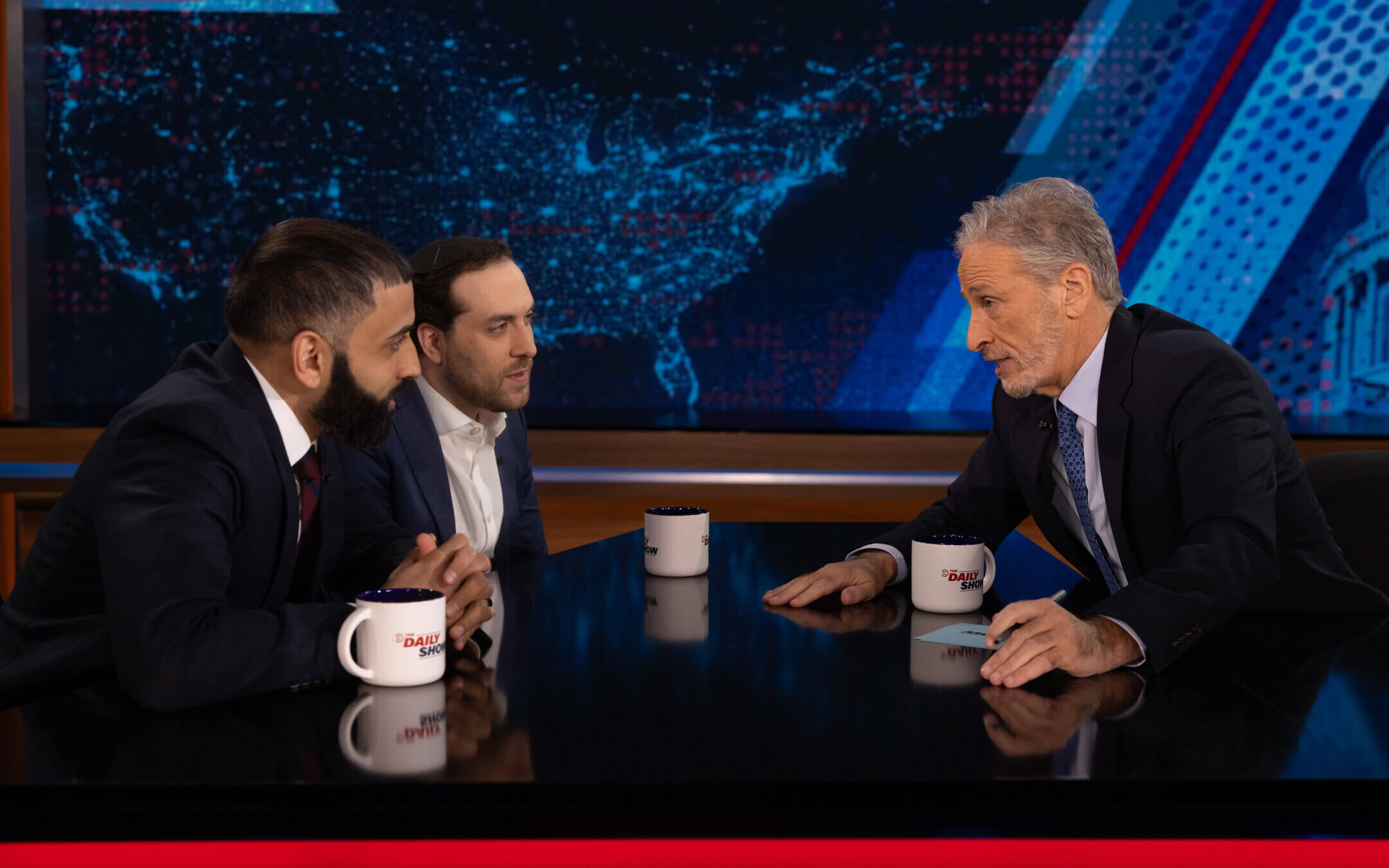Jon Stewart unveils his plan for Palestinian-Israeli peace
On ‘The Daily Show,’ the Monday night host addressed the war for the first time since his return

Jon Stewart interviews journalists and friends Yair Rosenberg and Murtaza Hussain. Photo by Matt Wilson/Comedy Central’s The Daily Show
On Monday’s The Daily Show, host emeritus Jon Stewart reluctantly, and in the end hopefully, addressed Israel’s war with Gaza.
Grimacing through a speedy, pharmaceutical ad-type disclaimer warning that the segment could cause “depression, anxiety, infections of the perineum and craving hummus,” Stewart breezed through the state of the conflict, with Benjamin Netanyahu’s plan to eliminate Hamas (what Stewart called “a siege”), Hamas leader Ghazi Hamad’s genocidal rhetoric, the U.N.’s uselessness in passing resolutions, the United States’ tentative warnings to Israel and the evangelical right’s wish that “blood will flow to the bridle of a horse.”
He called the segment “The Futile Crescent,” and it was a signature Stewart monologue, exasperated but ultimately Pollyannaish. Stewart even proposed his three plans for peace, the first being to send Israelis and Palestinians to a retreat at the Seeds of Peace camp in Maine, the second “Let’s ask God!” The third proposal was serious.
“Israel stops bombing, Hamas releases the hostages, the Arab countries who claim Palestine as their top priority come in and form a demilitarized zone between Israel and a free Palestinian state,” Stewart offered.
It would be a NATO-type agreement, but of course would need a different acronym: it will be the “Middle East Treaty Organization” or “METO.” He had to get a punchline in, but went to the experts with it too.
In the next segment Stewart interviewed journalists Murtaza Hussain of The Intercept and Yair Rosenberg of The Atlantic, who actually considered the METO idea, while poking holes in how willing Arab states would be to agree to it.
Hussain addressed how he believes U.S. foreign policy has a habit of writing blank checks to its partners and Rosenberg mentioned how Arab countries may pay lip service to Palestinian freedom, but would likely be unwilling to protect it with boots on the ground.
The final part of the interview played out like a bizarro-world version of Stewart’s famous appearance on Crossfire, where he lamented that hosts Tucker Carlson and Paul Begala’s partisan sniping was “hurting America.” Instead Stewart celebrated Hussain, who is Muslim, and Rosenberg, who’s an Orthodox Jew, having a close friendship.
Rosenberg revealed that he introduced Hussain to kosher restaurants, where the meat was halal for many Sunni Muslims, and they would discuss their differences of opinion.
“We refuse to allow ourselves or our communities to be held hostage to a ruinous conflict thousands of miles away that we may never be able to fully resolve or fix,” Rosenberg said.
Hussain added that it helps that they come to the table as Americans. “I can accept any Palestinian’s view or any Israeli’s view when they’re so intimately involved, but I can never respect a bloodthirsty American,” he said.
Stewart was heartened by Hussain and Rosenberg’s example of friendship and equanimity, saying he wanted them as his screensaver. (Personally I didn’t get the big deal that a Jew and a Muslim could have a civil or close relationship — I know plenty who do.)
Their example is a good one for America, and not just on issues concerning the Middle East. As for Israel and Gaza, we may need to do something a bit more drastic. Maybe Seeds of Peace should make a kayak reservation for Bibi Netanyahu and Yahya Sinwar.






















